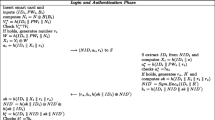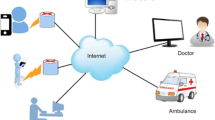Abstract
Telecare Medical Information System (TMIS) makes an efficient and convenient connection between patient(s)/user(s) at home and doctor(s) at a clinical center. To ensure secure connection between the two entities (patient(s)/user(s), doctor(s)), user authentication is enormously important for the medical server. In this regard, many authentication protocols have been proposed in the literature only for accessing single medical server. In order to fix the drawbacks of the single medical server, we have primarily developed a novel architecture for accessing several medical services of the multi-medical server, where a user can directly communicate with the doctor of the medical server securely. Thereafter, we have developed a smart card based user authentication and key agreement security protocol usable for TMIS system using cryptographic one-way hash function. We have analyzed the security of our proposed authentication scheme through both formal and informal security analysis. Furthermore, we have simulated the proposed scheme for the formal security verification using the widely-accepted AVISPA (Automated Validation of Internet Security Protocols and Applications) tool and showed that the scheme is secure against the replay and man-in-the-middle attacks. The informal security analysis is also presented which confirms that the protocol has well security protection on the relevant security attacks. The security and performance comparison analysis confirm that the proposed protocol not only provides security protection on the above mentioned attacks, but it also achieves better complexities along with efficient login and password change phase.









Similar content being viewed by others
References
Amin, R., Cryptanalysis and an efficient secure id-based remote user authentication using smart card. Int. J. Comput. Appl. 75(13):43–48, 2013.
Amin, R., Maitra, T., Giri, D., Article: An improved efficient remote user authentication scheme in multi-server environment using smart card. Int. J. Comput. Appl. 69(22):1–6, 2013.
Amin, R., Maitra, T., Rana, S.P., An improvement of wang. et. al.’s remote user authentication scheme against smart card security breach. Int. J. Comput. Appl. 75(13):37–42, 2013.
Armando, A., Basin, D., Boichut, Y., Chevalier, Y., Compagna, L., Cuellar, J., Drielsma, P., Hem, P., Kouchnarenko, O., Mantovani, J., Mdersheim, S., von Oheimb, D., Rusinowitch, M., Santiago, J., Turuani, M., Vigan, L., Vigneron, L.: The avispa tool for the automated validation of internet security protocols and applications. In: Computer Aided Verification, Vol. 3576, pp. 281–285. Lecture Notes in Computer Science (2005)
Bhargav-Spantzel, A., Squicciarini, A.C., Modi, S., Young, M., Bertino, E., Elliott, S.J., Privacy preserving multi-factor authentication with biometric. J. Comput. Secur. 15(5):529–560, 2007.
Cao, T., and Zhai, J., Improved dynamic id-based authentication scheme for telecare medical information systems. J. Med. Syst. 37(2):9912, 2013. doi:10.1007/s10916-012-9912-5.
Chang, Y.F., Yu, S.H., Shiao, D.R., A uniqueness-and-anonymity-preserving remote user authentication scheme for connected health care. J. Med. Syst. 37(2):9902, 2013. doi:10.1007/s10916-012-9902-7.
Chen, H.M., Lo, J.W., Yeh, C.K., An efficient and secure dynamic id-based authentication scheme for telecare medical information systems. J. Med. Syst. 36(6):3907–3915, 2012.
Chuang, M.C., and Chen, M.C., An anonymous multi-server authenticated key agreement scheme based on trust computing using smart cards and biometrics. Expert Syst. Appl. 41(4, Part 1):1411–1418, 2014.
Das, A., and Goswami, A., A secure and efficient uniqueness-and-anonymity-preserving remote user authentication scheme for connected health care. J. Med. Syst. 37(3):9948, 2013. doi:10.1007/s10916-013-9948-1.
Das, A.K., Analysis and improvement on an effcient biometric based remote user authentication scheme using smart cards. IET Inf. Secur. 5(3):145–151, 2011.
Debiao, H., Jianhua, C., Rui, Z., A more secure authentication scheme for telecare medicine information systems. J. Med. Syst. 36(3):1989–1995, 2012.
Dolev, D., and Yao, A.C., On the security of public key protocols. Information Theory. IEEE Trans. 29(2):198–208, 1983.
Fan, C.I., and Lin, Y.H., Provably secure remote truly three-factor authentication scheme with privacy protection on biometrics. Information Forensics and Security. IEEE Trans. 4(4):933–945, 2009.
Guo, C., and Chang, C.C., Chaotic maps-based password-authenticated key agreement using smart cards. Commun. Nonlinear Sci. Numer. Simul. 18(6):1433–1440, 2013.
Hao, X., Wang, J., Yang, Q., Yan, X., Li, P., A chaotic map-based authentication scheme for telecare medicine information systems. J. Med. Syst. 37(2):9919, 2013. doi:10.1007/s10916-012-9919-y.
Islam, S.H., and Biswas, G.P., A more efficient and secure id-based remote mutual authentication with key agreement scheme for mobile devices on elliptic curve cryptosystem. J. Syst. Softw. 84(11):1892–1898, 2011.
Jiang, Q., Ma, J., Lu, X., Tian, Y., Robust chaotic map-based authentication and key agreement scheme with strong anonymity for telecare medicine information systems. J. Med. Syst. 38(2):1–8, 2014. doi:10.1007/s10916-014-0012-6.
Jiang, Q., Ma, J., Ma, Z., Li, G., A privacy enhanced authentication scheme for telecare medical information systems. J. Med. Syst. 37(1):9897, 2013. doi:10.1007/s10916-012-9897-0.
Jina, A.T.B., Ling, D.N.C., Goh, A., Biohashing: Two factor authentication featuring fingerprint data and tokenised random number. Pattern Recogn. 37(11):2245–2255, 2004.
Khan, M.K., Kumari, S., Gupta, M., More efficient key-hash based fingerprint remote authentication scheme using mobile device. Comput. 96(9):793–816, 2014. doi:10.1007/s00607-013-0308-2.
Khan, M.K., and Zhang, J., Improving the security of a flexible biometric remote user authentication scheme. Comput. Stand. Interfaces 29(1):82–85, 2007.
Kocher, P., Jaffe, J., Jun, B., Differential power analysis. In: Advances in Cryptology CRYPTO 99. Vol. 1666, pp. 388–397: Lecture Notes in Computer Science, 1999.
Kumar, M., Gupta, M.K., Kumari, S., An improved efficient remote password authentication scheme with smart card over insecure networks. Int. J. Netw. Secur. 13(3):167–177, 2011.
Kumari, S., Gupta, M.K., Khan, M.K., Li, X., An improved timestamp-based password authentication scheme: comments, cryptanalysis, and improvement. Secur. Commun. Netw. 7:1921–1932, 2014. doi:10.1002/sec.906.
Kumari, S., Khan, M., Kumar, R., Cryptanalysis and improvement of a privacy enhanced scheme for telecare medical information systems. J. Med. Syst. 37(4):9952, 2013. doi:10.1007/s10916-013-9952-5.
Kumari, S., and Khan, M.K., More secure smart card based remote user password authentication scheme with user anonymity. Secur. Commun. Netw. 7:2039–2053, 2013. doi:10.1002/sec.916.
Kumari, S., and Khan, M.K., Cryptanalysis and improvement of ’a robust smart-card-based remote user password authentication scheme. Int. J. Commun. Syst. 27:3939–3955, 2014. doi:10.1002/dac.2590..
Kumari, S., Khan, M.K., Li, X., An improved remote user authentication scheme with key agreement. Comput. & Electr. Eng. 40(6):1997–2012, 2014. doi:10.1016/j.compeleceng.2014.05.007.
Kumari, S., Khan, M.K., Li, X., Wu, F., Design of a user anonymous password authentication scheme without smart card. Int. J. Commun. Syst. 27(10):609–618, 2014. doi:10.1002/dac.2853.
Lee, C.C., Hsu, C.W., Lai, Y.M., Vasilakos, A., An enhanced mobile-healthcare emergency system based on extended chaotic maps. J. Med. Syst. 37(5):9973, 2013. doi:10.1007/s10916-013-9973-0.
Lee, T.F., An efficient chaotic maps-based authentication and key agreement scheme using smartcards for telecare medicine information systems. J. Med. Syst. 37(6):1–9, 2013. doi:10.1007/s10916-013-9985-9.
Lee, T.F., Chang, I.P., Lin, T.H., Wang, C.C., A secure and efficient password- based user authentication scheme using smart cards for the integrated epr information system. J. Med. Syst. 37(3):3833–3838, 2013.
Li, C.T., and Hwang, M.S., An efficient biometrics-based remote user authentication scheme using smart cards. J. Netw. Comput. Appl. 33(1):1–5, 2010.
Li, C.T., Lee, C.C., Weng, C.Y., A secure chaotic maps and smart cards based password authentication and key agreement scheme with user anonymity for telecare medicine information systems. J. Med. Syst. 38(9):77, 2014. doi:10.1007/s10916-014-0077-2.
Li, X., Niu, J.W., Ma, J., Wang, W.D., Liu, C.L., Cryptanalysis and improvement of a biometrics-based remote user authentication scheme using smart cards. J. Netw. Comput. Appl. 34(1):73–79, 2011.
Li, X., Xiong, Y., Ma, J., Wang, W., An efficient and security dynamic identity based authentication protocol for multi-server architecture using smart cards. J. Netw. Comput. Appl. 35(2):763–769, 2012.
Lin, H.Y., On the security of a dynamic id-based authentication scheme for telecare medical information systems. J. Med. Syst. 37(2):1–5, 2013.
Lumini, A., and Nanni, L., Biohashing: Two factor authentication featuring fingerprint data and tokenised random number. Pattern Recogn. 40(3):1057–1065, 2007.
Maitra, T., and Giri, D., An efficient biometric and password-based remote user authentication using smart card for telecare medical information systems in multi-server environment. J. Med. Syst. 38(12):142, 2014. doi:10.1007/s10916-014-0142-x.
Messerges, T.S., Dabbish, E.A., Sloan, R.H., Examining smart-card security under the threat of power analysis attacks. IEEE Trans. Comput. 51(5):541–552, 2002.
Mishra, D., Mukhopadhyay, S., Chaturvedi, A., Kumari, S., Khan, M., Cryptanalysis and improvement of yan et al.s biometric-based authentication scheme for telecare medicine information systems. J. Med. Syst. 38(6): 24, 2014. doi:10.1007/s10916-014-0024-2.
Mishra, D., Srinivas, J., Mukhopadhyay, S., A secure and efficient chaotic map-based authenticated key agreement scheme for telecare medicine information systems. J. Med. Syst. 38(10): 120, 2014. doi:10.1007/s10916-014-0120-3.
Sood, S.K., Sarje, A.K., Singh, K., A secure dynamic identity based authentication protocol for multi-server architecture. J. Netw. Comput. Appl. 34(2):609–618, 2011.
Tan, Z., An efficient biometrics-based authentication scheme for telecare medicine information systems. Netw. 2(3):200–204, 2013.
Tool, A.W.: http://www.avispa-project.org/web-interface/ (2014)
Wang, B., and Ma, M., A smart card based efficient and secured multi-server authentication scheme. Wirel. Pers. Commun. 68(2):361–378, 2013.
Wei, J., Hu, X., Liu, W., An improved authentication scheme for telecare medicine information systems. J. Med. Syst. 36(6):3597–3604, 2012.
Wu, Z.Y., Lee, Y.C., Lai, F., Lee, H.C., Chung, Y., A secure authentication scheme for telecare medicine information systems. J. Med. Syst. 36(3):1529–1535, 2012.
Xie, Q., Zhang, J., Dong, N., Robust anonymous authentication scheme for telecare medical information systems. J. Med. Syst. 37(2):9911, 2013. doi:10.1007/s10916-012-9911-6.
Xue, K., Hong, P., Ma, C., A lightweight dynamic pseudonym identity based authentication and key agreement protocol without verification tables for multi-server architecture. J. Comput. Syst. Sci. 80(1):195–206, 2014.
Yan, X., Li, W., Li, P., Wang, J., Hao, X., Gong, P., A secure biometrics-based authentication scheme for telecare medicine information systems. J. Med. Syst. 37(5):1–6, 2013.
Yang, D., and Yang, B.: A biometric password-based multi-server authentication scheme with smart card. In: 2010 International Conference on, Computer Design and Applications (ICCDA). Vol. 5, pp. 554–559 (2010)
Zhu, Z., An efficient authentication scheme for telecare medicine information systems. J. Med. Syst. 36(6): 3833–3838, 2012.
Author information
Authors and Affiliations
Corresponding author
Additional information
This article is part of Topical Collection on Patient Facing Systems
Rights and permissions
About this article
Cite this article
Amin, R., Biswas, G.P. A Novel User Authentication and Key Agreement Protocol for Accessing Multi-Medical Server Usable in TMIS. J Med Syst 39, 33 (2015). https://doi.org/10.1007/s10916-015-0217-3
Received:
Accepted:
Published:
DOI: https://doi.org/10.1007/s10916-015-0217-3




